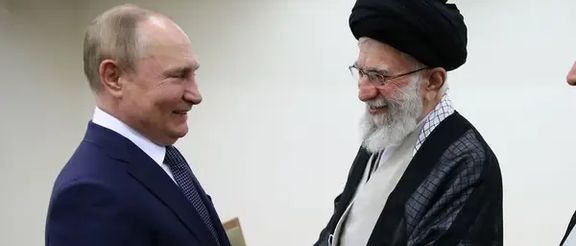According to two senior Iranian sources cited by Reuters, the plea for moderation was delivered by Sergei Shoigu, a key Putin ally, during a high-level meeting with Iranian officials in Tehran on Monday.
Shoigu's visit, as reported by Russia's state-run RIA news agency, highlighted Moscow's dual approach: condemning the assassination while advocating for a measured response from Iran. "The killing of Haniyeh is a very dangerous assassination," Shoigu allegedly stated.
The sources indicated that Shoigu’s visit was part of Russia's broader strategy to relay to Tehran the necessity of restraint, warning that a reckless response could lead to a major Middle Eastern war.
Iran's request for Russian military support
Despite the Kremlin's cautious approach, Tehran has not shied away from pressing its demands, including the acquisition of Russian-made Sukhoi Su-35 fighter jets. The two Iranian sources, who were privy to the discussions, disclosed to Reuters that this request was reiterated during Shoigu's visit, reflecting Iran's strategic ambitions amidst escalating tensions. Russia itself has lost hundreds of warplanes in its war on Ukraine and would be hard pressed to satisfy Iran's request.
An Israeli insider, who previously served as Commander of the Israel Air Defense Forces from 2015 to 2018, conveyed to Iran International that the current threat of war with Iran is notably different from the situation during Tehran's first direct attack on Israel in April. Brigadier General Zvika Haimovich indicated that Hezbollah is expected to play a pivotal role in Iran's anticipated retaliation this time. He expressed that he could not envision any outcome other than Iran responding to last week's killing, which Tehran has attributed to Israel.
"In the long term, I think we need to focus on the Iranian nuclear, wielding vision and capabilities, and build a strong and stable coalition led by the United States of America and also the Arab Sunni states against Iran," Haimovich stated.
International concerns and potential for conflict
The potential fallout from Iran's retaliation has alarmed international observers. An unnamed Biden administration official, speaking to Reuters, emphasized the risks of a significant regional conflict, stating, "The scale of Iran's and Hezbollah's response will be a key factor in determining the extent of a potential conflict." This sentiment is shared across Western capitals, where there is a palpable fear that Iran's aggressive posturing could spiral out of control, especially if coupled with Hezbollah's actions in Lebanon.
In Tehran, Ali Bagheri Kani, the acting head of the Foreign Ministry, reiterated Iran's stance, asserting that the assassination of Haniyeh was a "violation of international law" and that the Islamic Republic "has the right to take appropriate measures to defend and protect its national security and sovereignty." This rhetoric was echoed by Hezbollah, with a prominent Lebanese source close to the group telling Reuters, "A retaliatory strike is inevitable and diplomacy is no longer a viable option." The source added that while Iran seeks a severe response, it does not intend to spark a full-scale regional war.
In a separate discussion, former CIA director and US CENTCOM Commander David Petraeus, in an exclusive interview with Iran International, suggested that both Iran and Israel are likely to avoid an all-out war due to the catastrophic consequences it could entail for both nations.
“I think [the Iranians] have to respond,” Petraeus told Iran International's Marzia Hussaini, “this is an enormous blow to Iran's honor… It's a huge intelligence failure and… a security failure. So, they have to respond. But I don't think that Iran wants to get into a real direct back and forth war with Israel… And frankly, I don't think Israel wants to get in a real full-on war with Hezbollah or with Iran," he explained.
Israeli and US preparations for potential escalation
In response to these developments, Israel has been ramping up its military preparedness. Israeli Defense Minister Yoav Gallant warned that the nation must be ready for all scenarios, including "a swift transition to offense" should Iran or Hezbollah launch attacks.
According to sources familiar with recent Israeli assessments, the country's response to any aggression will be calibrated based on the damage incurred rather than the scale of the attack.
Meanwhile, US intelligence has briefed President Joe Biden and Vice President Kamala Harris on potential scenarios, including possible waves of attacks from Hezbollah and other Iranian proxies. Axios reported that the intelligence community believes Iran and Hezbollah's response is still a "work in progress," with both actors undecided on the exact nature of their retaliation.
Rising tensions and regional dynamics
The regional dynamics are further complicated by recent events. A Tuesday NOTAM (Notice to Airmen) posted on the US Federal Aviation Administration warned pilots that there is a risk of gun firing activities in western Iran on August 7 and 8. It has set the danger zone up to an altitude of 12,000 feet above mean sea level.
Concurrently, Israeli warplanes conducted a series of aggressive maneuvers over Beirut, breaking the sound barrier and causing widespread panic just before a scheduled speech by Hezbollah chief Sayyed Hassan Nasrallah. The IDF has also confirmed airstrikes in southern Lebanon, targeting Hezbollah's infrastructure, as reported by Hebrew media. Lebanese media say at least four people were killed in the strikes in southern Lebanon.
As noted by a senior US official focused on Middle Eastern affairs, "We are doing everything we can to dissuade all parties from going to a place they can’t get back from," urging other regional and European states to exert more influence to de-escalate tensions. A Qatari official also echoed this sentiment, indicating that Doha is in constant communication with Tehran to reduce the likelihood of a conflict.







